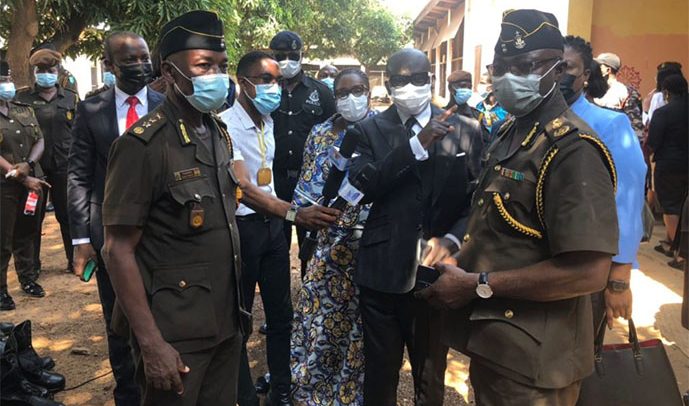The Attorney General signing the visitors’ book
The Attorney General and Minister of Justice, Godfred Yeboah Dame, has initiated what he calls measures to have legislations that will have far-reaching positive consequences for the criminal justice system.
He said he is introducing two important pieces of legislations namely Plea Bargaining and Alternative Sentencing, to decongest the prisons and also ensure proper reformation of inmates.
“My Office is seeking to introduce two important pieces of legislation which will have far-reaching consequences for the criminal justice system,” he said yesterday when he visited the James Camp Borstal Institute, Roman Ridge, Accra, and the Senior Correctional Centre at Roman Ridge, also in Accra.
“The first is an amendment to the Criminal Procedure Act, 1960 (Act 30) to incorporate plea bargaining firmly into the trial of cases,” he said, adding “by this amendment to the Criminal Procedure Act, plea bargaining will be permissible in all cases save a few that will be set out in the Act.”
“I am happy to state that Cabinet about three weeks ago, granted approval to my request for the policy and the Bill for the amendment of the Criminal Procedure Act to incorporate plea bargaining to be laid before Parliament. Pursuant to the directives of Cabinet, I am consulting the Hon. Minister for the Interior on the exceptions to plea bargaining.”
According to the Attorney General (AG), he has proposed that treason, violent offences like rape, genocide, robbery, kidnapping, murder, attempted murder, abduction, defilement, piracy and offences related to public elections be excluded from plea bargaining.
“Apart from these offences, plea bargaining will be available in all other cases. I consider the introduction of plea bargaining the most significant innovation in the process of reform of the criminal justice system in Ghana which has the ultimate object of easing congestion in our prisons,” he said.
The AG said “it is worthy to state that in order to safeguard against abuses, plea bargaining will be done only with the consent of the Attorney General in line with his constitutional mandate under Article 88 and will be done under strict conditions set out in the proposed bill.”
Mr. Dame said the second innovation to ease congestion in the prisons is the passage of an Alternative Sentencing Act which he said is an urgent necessity.
“I recently reviewed a draft Community Sentencing Bill that I charged the Director of Legislative Drafting in my Office to come up with. The draft Bill seeks to provide options for sentencing other than prison term for various offences considered not to be too serious,” he disclosed.
The AG said “it is going through the process of stakeholder consultations and will soon be laid before Parliament upon conclusion. I am treating it both pieces of legislation as part of my priority legislations this year.”
The AG acknowledged the impact of the Justice for All Programme which was set up to help decongest the prisons, but added that it does not appear to have “generally solved the problem of congestion in Ghanaian prisons.”
He said “the Attorney General is not just an unconcerned jailor who ceases to care about the plight of persons serving various sentences in prison or even remand prisoners,” adding “our prisons are supposed to provide conditions for learning and improving the education of prisoners.”
He promised the Director-General of Ghana Prisons Service, who was with him on the tour that he will “lead the advocacy in improving conditions in our prisons.”
The AG used the occasion to donate a few items to assist with the feeding and care of the inmates.
The AG was accompanied by his two deputies: Alfred Tuah Yeboah and Diana Asonaba-Dapaah, the Solicitor-General, Helen Awo Ziwu and Director of Public Prosecutions Division, Yvonne Atakora-Obuobisa and were met on arrival by the Director-General of Ghana Prisons Service, Isaac Egyir and the Deputy Minister for the Interior, Naana Eyiah.
By Ernest Kofi Adu


